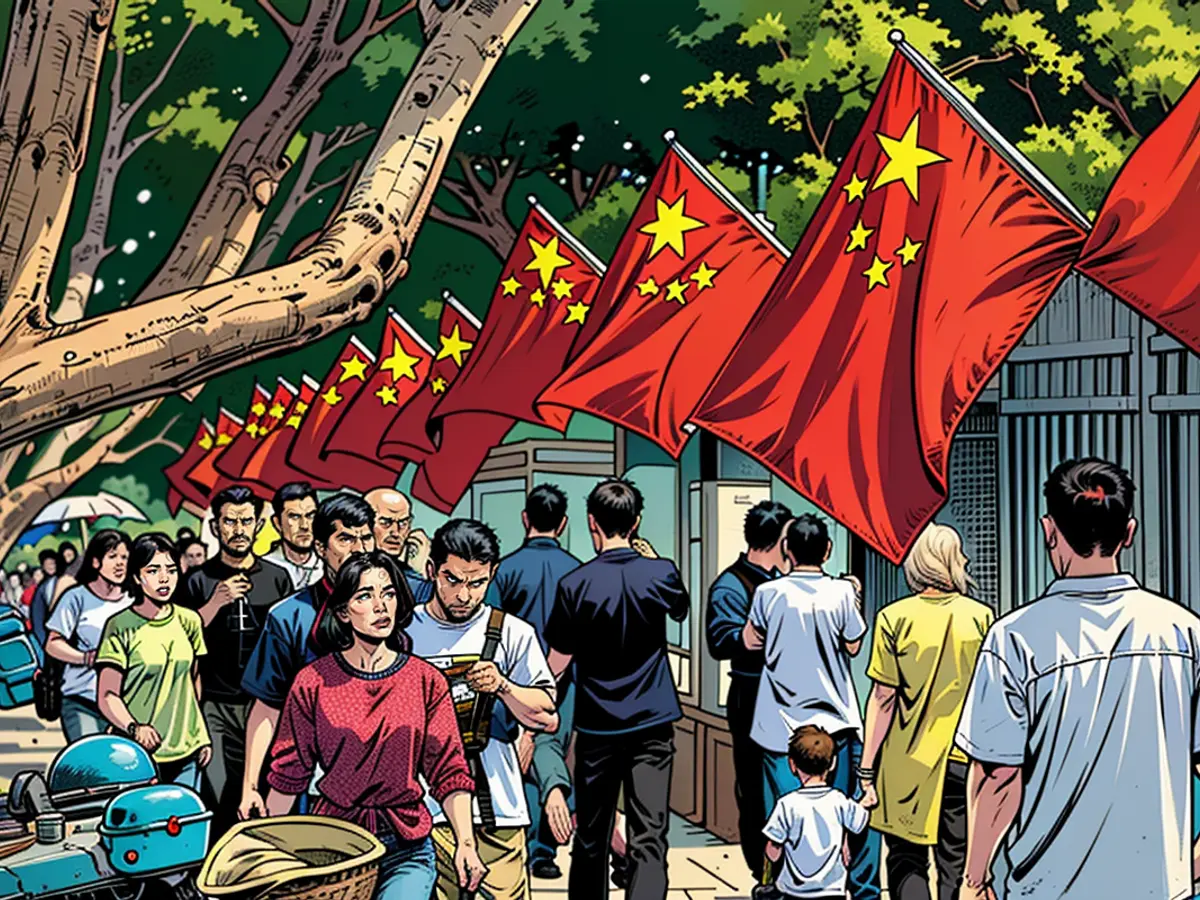Commemorating its 75th anniversary, Communist China is not met with unanimous joy and merriment by all.
The nation's rising stars are facing difficulty securing employment; its corporate figures are dealing with wage reduction and termination; its business owners are grappling with financing their ventures and clearing debts; its middle-income households are witnessing their assets dwindle due to property market collapse; and its wealthy individuals are transferring funds abroad.
As the nation moves closer to the 75th anniversary of its establishment on October 1, the zeitgeist can be summarized by a new term: "the junk time of history." Analogous to the final moments of a basketball game with an insurmountable lead, some view their country stuck in a similarly dismal period with little prospect of improvement.
This gloomy projection contrasts significantly from the optimistic perspective five years ago during the previous major National Day festivities in 2019. Back then, economists were eagerly discussing when China might surpass the United States to become the world's leading economy. Today, discussions revolve around avoiding a reprise of Japan's "lost decade" of stagnation, which followed its real estate bubble burst in the 1990s.
Last week, after months of distressing economic data, China's leader Xi Jinping authorized a much-needed stimulus plan to bolster confidence in the world's second-largest economy.
On October 1, the country's central bank declared a set of measures to counteract falling prices, such as enabling commercial banks to lend more and reducing interest rates for households and companies.
The following day, officials reiterated their positive stance by providing financial assistance to disadvantaged citizens and offering subsidies for recent graduates struggling to land jobs.
On Thursday, the Communist Party's 24-member Politburo carried on the optimistic rhetoric. In an unusual move, Xi focused the group's September gathering on economic matters.
The prominent officials acknowledged the emergence of "new circumstances and issues" in the economy and emphasized the urgent requirement to boost government spending, reverse the property market decline, and enhance job opportunities for recent graduates and migrant workers.
As per Xu Tianchen, senior economist at the Economist Intelligence Unit, the "unusual, simultaneous implementation of various measures underscored the urgency for policymakers to bolster the economy."
The policy push injected energy into the country's ailing stock market just days before the week-long national holiday, which commences on October 1. China's blue-chip stocks surged more than 15% the previous week, marking its most significant weekly gain in nearly 16 years, and continued to climb on Monday. Hong Kong's Hang Seng index skyrocketed 13%, achieving its best weekly performance since 1998, according to Reuters.
Stock market surge
The market recovery led to an "unusual slowdown" in the Shanghai Stock Exchange's system on Friday morning, as it struggled to adapt to a surge in trading activity.
Even established investors jumped on the bandwagon. David Tepper, the billionaire founder of American hedge fund Appaloosa Management, declared on Thursday to CNBC that he was increasing his investment in everything related to China.
Although the stock market is currently experiencing a remarkable rally, economists argue that reviving China's economic downturn will necessitate additional efforts.
"Stimulating the stock market doesn't really benefit the actual economy in China. Very few people invest in the stock market compared to other major markets," said Logan Wright, director of China markets research at Rhodium Group.
Chinese households have sustained colossal losses from the slump in the property market, estimated to be an astounding $18 trillion, claimed Barclays economists in a research note earlier this month. This equates to around $60,000 lost by each three-person household in China, an amount that surpasses China's per capita gross domestic product almost fivefold.
Wright stated that the stimulus plan "enhances the leadership's perception as more proactive, more attentive to the economy's decline. And that accounts for some of the more positive sentiment (recently). Yet, nothing fundamentally alters in terms of the long-term outlook."
China's prolonged investment-driven growth appears to have reached its limit, and comprehensive modifications to its fiscal system - including income redistribution and increased household transfers - are vital to shift the economy towards a more sustainable consumption-driven growth model, Wright argued.
There have been few responses to the structural issues hindering economic growth in the deluge of measures announced last week.
China has long had one of the highest saving rates globally. Even though one-time cash handouts and subsidies may stimulate short-term consumption, robust social security and health care are needed to encourage Chinese households to spend more long-term, particularly post-collapse in the property sector, where most Chinese save their funds.
Real estate struggles
The state of the real estate sector, which comprises approximately a quarter of the Chinese economy and 70% of household wealth, remains bleak.
"There's not much Beijing can do," Wright said. "In many ways, the readjustment in the property sector is nearly complete, and policy hasn't been particularly successful in restoring demand, with prices of new properties continuing their downward spiral."
After decades of expansion, China's real estate sector has been in decline for four consecutive years since plunging into a deep crisis in 2020, when the government cracked down on excessive borrowing by developers to control their high debt levels. Beijing's attempts to revitalize the market have failed to reignite demand, with new home prices continuing to plummet.
In a bid to support the struggling property sector, Guangzhou, a first-tier city in the south, became the first to eliminate all home purchase restrictions on October 1, while Shanghai and Shenzhen also loosened home buying guidelines.
The nation presently boasts an abundance of vacant apartments that even its 1.4 billion inhabitants can't fill fully. To add to the woes, the population has been decreasing for two consecutive years, a shift in demographics that may hamper future expansion further.
China's government's strategies to boost birth rates have proven futile. An increasing number of young individuals are postponing marriage and childbirth, or entirely avoiding them. Many are disheartened or fatigued by "involution" – a term describing the intense competition that has characterized their lives, from striving for academic excellence to establishing a successful career. Some are resorting to "lying flat" or "letting it rot," a form of passive resistance against societal pressures by just doing enough to get by.
These phrases embody a growing sense of despair among China's disillusioned youth. Some are realizing that their life trajectories are becoming misaligned with the anticipated continuous improvement depicted in Xi's "China dream," a ambitious vision of "unstoppable" national rejuvenation.
Growing up during a period of blistering economic growth and unending improvement in the standard of living, China's Gen-Zs are now grappling with the prospect of not surpassing their parents, whose generation accepted restricted freedoms in exchange for promised prosperity.
Over the past few years, China's youth have witnessed their personal liberties diminish under Xi's authoritarian regime and their job opportunities dwindle in a slowing economy.
Xi's crackdown on the private sector, ranging from tech giants to private tutoring, has eliminated many jobs previously accessible to China's fresh graduates. The youth unemployment rate skyrocketed to 18.8% in August, the highest since authorities altered the methodology last year to exclude students.
This situation could pose a challenge for the Communist Party, which for decades has based its legitimacy on the nation's unprecedented growth. As the economy slows down, Xi has strengthened another foundation of the regime's legitimacy: nationalism, which he is likely to evoke to celebrate the country's 75th anniversary on Tuesday.
However, Alfred Wu, an associate professor at the Lee Kuan Yew School of Public Policy at the National University of Singapore, stated that Chinese leaders are not "intending to abandon the economic performance argument yet."
"They want to rebuild confidence in the economy, but the most troublesome headache for the Communist Party is they don't have effective solutions to the economic slowdown."
In light of the ongoing economic struggles, many business owners are now focusing on cost-cutting measures and restructuring their ventures to survive. During this challenging period, securing financing for businesses has become increasingly difficult.
The economic downturn has also resulted in numerous job layoffs and wage reductions within the corporate sector, making it challenging for employees to make ends meet. As a result, many middle-income households are seeing their once-stable income streams decrease and their assets shrink due to the collapse of the property market.









